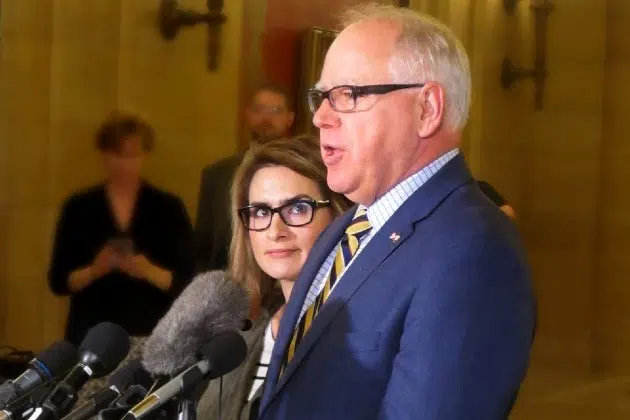(KNSI) — Minnesota Governor Tim Walz Thursday unveiled his proposed two-year, $4.1 billion economic budget.
The package creates a Paid Family and Medical Leave program for workers who need to take time off to care for a new baby or a family member with a serious illness, earned sick and “safe time” for workers to accrue up to 48 hours a year for when they need to recover from an illness, go to a medical appointment, care for a child during a school closure, or get care and assistance due to domestic abuse, stalking, or sexual assault.
It would also expand unemployment benefits to hourly workers at K-12 schools who may need to apply for unemployment in the summer.
Thirty million dollars would go toward the Drive 5 Workforce Fund over the next two years for money to help people get into five high-growth job categories of technology, caring professions such as nursing, social work or teaching, education, manufacturing, and trades.
The budget also offers money to address issues within the healthcare industry, like expanded training, mental health, and recruitment. It also recommends joining into a union contract with SEIU Healthcare of Minnesota and Iowa for a rate increase extended to 20,000 homecare workers, addressing teacher shortages and free college applications for qualifying students.
Small businesses, hit hard during the COVID-19 pandemic shutdowns, would get $18.5 million for the Small Business Navigation Program, Small Business Development Centers, and the Small Business Partnerships Program over the next two years. Twenty million dollars would be set aside for an Angel Tax Credit for early-stage businesses to provide a tax credit for investors or investment funds aimed at small businesses in greater Minnesota and BIPOC, women or veteran-owned businesses. A Minnesota Forward Fund would get $150 million to create grants, loans, and forgivable loans for infrastructure or large-scale economic development projects.
It also includes $276 million for border-to-border broadband internet and $10 million for communities struck by potential job losses as power plants close to “diversify their economies” and “find new opportunities for quality jobs and economic growth.”
The City of Becker is preparing for those job losses as the Minnesota Pollution Control Agency has mandated the Xcel Energy Sherburne County Generating Station coal-fired power plant cease operations by 2030.
Money would go toward a pre-weatherization and workforce training program to cover the costs of repairing homes with health and safety issues and growing the “clean energy workforce” to expand the Solar for Schools program to reduce energy costs for educational institutions. Aging energy infrastructure would be replaced with “climate-smart design” to combat flooding and heat island effect and create local jobs. Framework for a statewide commercial energy code would be laid down for all new commercial and large multi-family construction to be net zero by 2036.
Farmers and ag producers would be eligible for grants to help meat, poultry, egg, and milk processors start up, modernize, or expand their businesses. The Minnesota Grown program would also expand under the proposal and continues the Agricultural Growth, Research, and Innovation (AGRI) program, which provides financial assistance for activities that advance Minnesota’s agricultural and renewable energy industries. Money would also be put back into the Agricultural Emergency Account to help in times of drought, flooding, bird flu and other animal disease outbreaks.
This is the latest in the piecemeal approach to introducing aspects of the larger state budget, which Governor Walz will officially release on January 24th.
___
Copyright 2023 Leighton Enterprises, Inc. All rights reserved. This material may not be broadcast, published, redistributed, or rewritten, in any way without consent.







